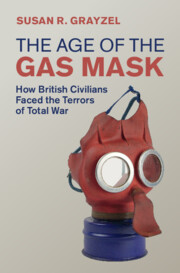
- Publisher:
- Cambridge University Press
- Online publication date:
- July 2022
- Print publication year:
- 2022
- Online ISBN:
- 9781108868068


The First World War introduced the widespread use of lethal chemical weapons. In its aftermath, the British government, like that of many states, had to prepare civilians to confront such weapons in a future war. Over the course of the interwar period, it developed individual anti-gas protection as a cornerstone of civil defence. Susan R. Grayzel traces the fascinating history of one object – the civilian gas mask – through the years 1915–1945 and, in so doing, reveals the reach of modern, total war and the limits of the state trying to safeguard civilian life in an extensive empire. Drawing on records from Britain's Colonial, Foreign, War and Home Offices and other archives alongside newspapers, journals, personal accounts and cultural sources, she connects the histories of the First and Second World Wars, combatants and civilians, men and women, metropole and colony, illuminating how new technologies of warfare shaped culture, politics, and society.
‘Grayzel's book is a compelling account of the social life of gas masks. She tells the history of war through one object – the gas mask – highlighting the tsunami of emotions it incites, the intensity of people's imagination, and their terror in the face of bodily violence. It is a book guaranteed to destroy any complacency about the inhumanity of war.'
Joanna Bourke - author of Wounding the World: How Military Violence and War-Play Invade our Lives
‘This book encourages us to think about the idea of total war in the 20th century in new and surprising ways, through the lens of material culture, and the ‘weaponisation of the air'. Grayzel illuminates novel ways of thinking about the relationship between individual citizens and states, and the way that war permeated all aspects of life, for both men and women. Britain, and its empire, appear as fresh sites for understanding total war. I expect this will be a landmark book for the social and cultural history of the First and Second World Wars.'
Yasmin Khan - author of The Raj at War: a People's History of India's Second World War
‘One of the most horrifying strategies of twentieth-century warfare involved poisoning the air. Grayzel's meticulous study of popular and political responses to this awful prospect opens out the meanings and the legacies of efforts to protect the civilian body and offers new ways of understanding modern war.'
Penny Summerfield Source: author of Contesting Home Defence: Men, Women and the Home Guard in the Second World War
‘Grayzel’s impressive archival collection reveals the value of tracing one technological object as it moved from the battlefield onto civilian bodies and eventually into the minds of an entire generation.’
Peter Thompson Source: Technology and Culture
 Loading metrics...
Loading metrics...
* Views captured on Cambridge Core between #date#. This data will be updated every 24 hours.
Usage data cannot currently be displayed.